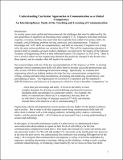Understanding Curricular Approaches to Communication as a Global Competency: An Interdisciplinary Study of the Teaching and Learning of Communication
Author(s)
White, Christina Kay; Breslow, Lori; Hastings, Daniel E.
DownloadASEE_Communication Study_Final.pdf (175.4Kb)
OPEN_ACCESS_POLICY
Open Access Policy
Creative Commons Attribution-Noncommercial-Share Alike
Terms of use
Metadata
Show full item recordAbstract
As society grows more global and interconnected, the challenges that must be addressed by the next generation of engineers are becoming more complex. Engineers need deep technical expertise, of course, but they also need what have typically been called 21st-century skills, for example, critical thinking, problem solving, teamwork, and communication. Technical
knowledge and “soft” skills are complementary, and both are necessary if engineers are to help solve the most serious problems our societies face. This call for engineering education to position itself so students can meet modern challenges was laid out by the leaders of the National
Academy of Engineering (NAE) in their influential reports, The Engineer of 2020. There is now a need to reflect on how engineering education has positively changed in the decade since those reports, and to consider what still needs to be tackled.
Date issued
2015-06Department
Massachusetts Institute of Technology. Department of Aeronautics and Astronautics; Singapore-MIT Alliance in Research and Technology (SMART); Sloan School of ManagementJournal
2015 ASEE Annual Conference and Exposition Proceedings
Publisher
American Society for Engineering Education (ASEE)
Citation
White, Christina, Lori Breslow, and Daniel Hastings. “Understanding Curricular Approaches to Communication as a Global Competency: An Interdisciplinary Study of the Teaching and Learning of Communication.” ASEE Conferences, 2015. 26.1621.1-26.1621.11.
Version: Original manuscript
ISBN
978-0-692-50180-1
ISSN
2153-5965